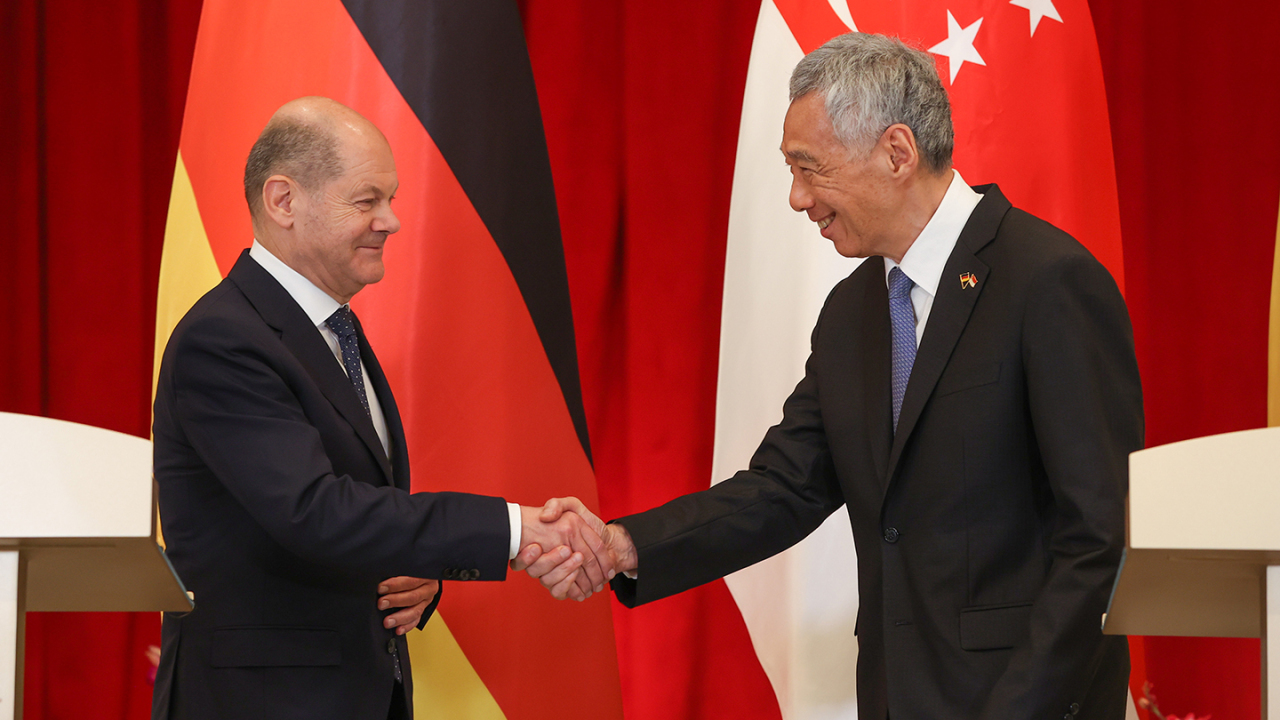Singapore, Germany forge stronger ties to bolster supply chains
South Korea under greater pressure to reduce dependency on China
By Jung Min-kyungPublished : Nov. 16, 2022 - 15:09

The move comes as the European Union member nation, among many other key economies, has been burdened with the task of cutting back their reliance on China.
“Reducing risky, one-sided dependencies when it comes to certain raw materials or critical technologies will play an important role in the National Security Strategy that we are currently working on,” German Chancellor Olaf Scholz said Monday, in a speech at the 17th Asia-Pacific Conference of German Business held in Singapore.
“Our view of the matter is clear: The best way to achieve more resilient supply chains is to diversify our trade relations,” he added.
Scholz’s remarks are in line with his meeting with Singapore’s Prime Minister Lee Hsien Loong held the same day. Through the meeting, both countries endorsed a joint declaration to strengthen their partnership in achieving sustainable and green development.
Scholz, in his speech at the conference, also warned that “decoupling” from a trade partner such as China could result in protectionism.
“Diversification, however, doesn’t mean decoupling,” he said.
“That difference matters at a time when concepts such as near-shoring, deglobalization and self-sufficiency are gaining traction. Often these ideas are nothing but protectionism in disguise -- and protectionism leads nowhere.”
German business leaders echoed Scholz, with Siemens CEO Roland Busch highlighting that amicable ties with China is a crucial key to achieve net-zero goals and supply chain diversification.
“Without China there will be no way to meet our targets to reduce temperature,” Busch said in a welcoming speech that kicked off the two-day conference on Sunday.
“The Ukraine issue has demonstrated how difficult and how painful it is when there is too much dependence on one source and certain supplies. We made it very clear that it's not about leaving China or not doing business there. … China is doing the same: They're also diversifying and securing their supply chains,” he added.
Busch was part of the economic delegation that visited China with Scholz early this month. Scholz was the first among the G-7 leaders to meet with Chinese President Xi Jinping since the COVID-19 pandemic broke out in 2020.
South Korea's China dilemma
South Korea has arrived at a crucial time of balancing out its trade ties with the US and China, its oldest ally and the largest trading partner, respectively, according to local experts.
In his first summit with the Chinese leader at G-20 in Bali, Indonesia, Tuesday, President Yoon Suk-yeol stressed that his government’s newly disclosed Indo-Pacific strategy is not meant to exclude China. The strategy had prompted speculation that South Korea is aligning itself closer with the US.
“Korea’s dialogue channel with China had been cut off for some three years now,” said Choo Jae-woo, a professor of Chinese foreign policy at Kyung Hee University.
“The latest summit that laid out the foundation for a fresh dialogue channel is likely to accelerate the pace of free trade agreement talks and other economic negotiation between the two countries.”
On the other hand, the US has been luring South Korea to join the "Chip 4" alliance alongside Japan and Taiwan, which aims to reshape the supply chain of semiconductors among like-minded countries.
"With the recent release of the joint statement among leaders of South Korea, US and Japan in Phnom Penh shaping up the Korea-US cooperation, China is likely to take issue with the partnership if it poses as a real threat to them," Park Won-gon, an international studies professor at Ewha Womans University said.
Meanwhile, Singapore’s Deputy Prime Minister Lawrence Wong said it would greet South Korea with open arms in forging a tighter economic partnership.
“No country wants to be in a position to choose sides between China and the US,” Wong said at the conference.
“This means keeping the region open, inclusive and connected to the world, welcoming major partners such as the EU, Japan, South Korea or India to build stakes and create a web of interdependencies and fostering conditions for major powers to have overlapping circles of friends.”
(mkjung@heraldcorp.com)


















![[KH Explains] Hyundai's full hybrid edge to pay off amid slow transition to pure EVs](http://res.heraldm.com/phpwas/restmb_idxmake.php?idx=652&simg=/content/image/2024/04/18/20240418050645_0.jpg&u=20240418181020)

![[Today’s K-pop] Zico drops snippet of collaboration with Jennie](http://res.heraldm.com/phpwas/restmb_idxmake.php?idx=642&simg=/content/image/2024/04/18/20240418050702_0.jpg&u=)